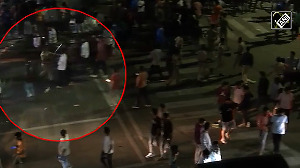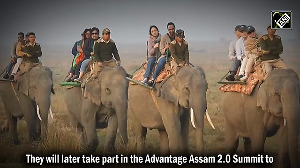Pakistan security forces have killed prominent Baloch nationalist leader Nawab Akbar Bugti, his grandson and 37 armed rebels even as they lost 21 of their soldiers in a major raid.
The raid has resulted in unprecedented violence in Quetta and officials have imposed a curfew.
"It is confirmed Nawab Bugti has been killed in an operation," Information Minister Muhammad Ali Durrani said in Islamabad late on Saturday night.
The Baloch leader's son-in-law, Senator Agha Bugti, also said that 80-year-old Bugti was killed in the military operation near Dera Bugti town, which is close to a mountain hideout in the restive Balochistan.
As news of Bugti's death spread, angry mobs attacked petrol pumps, banks and fired on police, said a top police official in Balochistan's capital Quetta, Syed Muhammad.
The army, police and law enforcing agencies have been deployed in Quetta, where a curfew has been imposed, he told Geo TV.
Protesters set tyres on fire and also torched several vehicles. Some people were injured but no loss of life was reported in violence.
Pakistan government also declared red alert in the rest of the country, specially Karachi and Lahore, anticipating heavy public protest over the killing of Bugti.
The military operation in Bhambhoor area was launched three days ago using heavy weapons and helicopter gun ships.
More troops were inducted into the operation and the gun ships shelled the area throughout Saturday.
The gun ships targeted the Chalgri area of Bhambhoor mountains and dropped troops who took action, the Dawn reported.
Armed militants of Marri and Bugti tribes resisted the troops and heavy fighting was reported for several hours.
Defence Ministry officials said 21 of their personnel were also killed, adding that six officers, a colonel, two majors and three captains were among the dead.
A spokesman of Marri tribe, another Baloch tribe, was quoted by the Dawn as claiming that 140 people from Bugti and Marri tribes were killed in yesterday's operation in Chalgri area.
"Nawab Bugti and many others were killed when helicopter gun ships dropped bombs at their hideout," the newspaper quoted officials here as saying. Troops also arrested over two-dozen injured militants.
Officials said Bugti's grandson, Nawabzada Baramdagh Bugti, was among the dead.
A private TV channel reported that another Baloch nationalist leader Mir Balaach Khan Marri was also killed in the operation.
Bugti, the British-educated tribal leader, along with a large band of tribesmen had waged an armed revolt against Pakistan, demanding more autonomy and removal of military cantonments from the sparsely populated Balochistan province, which is Pakistan's largest and richest in terms of area and natural resources.
After hearing the news about Bugti's death, hundreds of students of Balochistan University came out on the main Sariab Road and protested against the killing.
They broke doors and windows of the university hostel and attacked passing vehicles. Police rushed to the area and fired in the air to disperse the protesting students.
Reports said the hideout of Bugti was tracked through a satellite tracking system provided by the US after which the operation was launched.
Leaders of major opposition parties, including former premier Nawaz Sharif, Pakistan Peoples Party leader Makhdoom Amin Faheem and Hafiz Hussain Ahmed of Muttahida Majlis-e Amal, expressed shock and grief over the killing of Bugti and opposed the use of force in Balochistan.
Muttahida Qaumi Movement leader Altaf Hussain also condemned the killing of Bugti and extended condolences to his family. He said his party always opposed military operation in Balochistan and called for talks to resolve the issue.
Bugti, the leader of Baloch tribe called Bugtis, was the former chief minister and the governor of the province.
Though several tribes of Balochistan bordering Iran and Afghanistan have been agitating for long for more autonomy, their protest grew after 2002 when President Pervez Musharraf announced plans to develop Gwadar port with Chinese assistance as well other development schemes and publicly encouraged mass migration from other provinces to Balochistan.
Bugti and other tribal leaders termed the government's attempts as colonisation and stepped up their agitation. They also strongly resisted building of several army cantonments.
The resistance became stronger by 2004 and Bugti along with other tribesmen went underground to launch an armed revolt from the hideouts.






 © 2025
© 2025